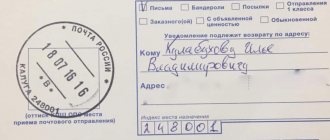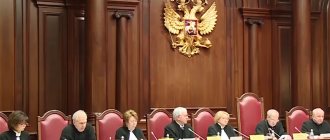The Code of Criminal Procedure defines a witness as a person who has some information of interest in a criminal case. A witness can be not only a direct eyewitness to the incident, but also a person who has learned information of interest to the investigation and the court from other persons. Article 56 of the Code of Criminal Procedure establishes the rights of a witness in a criminal case, as well as his duties.
Who is not allowed as witnesses?
Certain categories of citizens cannot, due to objective circumstances, be involved in the case as a witness:
note
In case of violation of the rules established by law, liability for disclosure of personal data may follow. The Criminal Code of the Russian Federation provides for penalties up to imprisonment for up to 4 years. Read more in the article here
- Judges and juries may not provide information regarding the facts of a case in which they were involved.
- Lawyers cannot disclose information they learn in connection with the conduct of a person's case. The person who committed the crime, or when providing him with legal assistance.
- The priest cannot violate the secret of confession.
- A deputy of the State Duma, a member of the Federation Council may testify about circumstances that have become known to him in connection with his work activity only if he wishes.
- A tax inspector cannot talk about the data contained in a special declaration submitted in accordance with the legislation on the voluntary declaration of citizens.
- The arbitrator (arbitrator) does not testify regarding the circumstances of the case in arbitration.
Basic rights of a witness
In accordance with Article 56 of the Code of Criminal Procedure, the basic rights of a witness in a criminal case include:
- Know the essence of the investigative action being carried out with his participation.
- Know the charges and brief circumstances of the case under consideration.
- Write down your testimony in your own hand in the interrogation protocol.
- Speak during interrogation in your native language and challenge the translator who was invited to the case to translate the testimony of the witness. A recusal is a requirement to change a specialist throughout the entire criminal proceedings.
- Have a defense attorney during criminal proceedings (the choice of a defense attorney is carried out by the witness himself).
- Use special documentation to testify if the information he tells concerns complex technical and other calculations.
- Complain (orally and in writing) to the prosecutor about the actions of the investigator or interrogator leading the trial.
- Demand compensation for funds spent on arriving at the place of interrogation.
- Do not give any evidence in the case. A witness may refuse to testify only regarding information that may cause harm to himself or his loved ones.
Witness protection
To ensure that testifying does not have negative consequences for the witness, the Code of Criminal Procedure provides for its protection. The protective measures are as follows:
- Possibility to testify under a pseudonym.
- Identification of a suspect in conditions where the latter cannot see the witness.
- Conducting a court hearing behind closed doors.
- Giving evidence by a witness in court without disclosing personal information, as well as in conditions where visual contact of the witness with other participants in the process is excluded.
The difference between an attesting witness and a witness is that the latter gives evidence about the progress or details of the crime, while the attesting witness is involved in observing investigative activities within the framework of an already committed unlawful act.
What a witness should not do
In addition to the rights, a witness in a criminal case has a number of duties, for failure to fulfill which serious liability is provided, including the initiation of a criminal case.
So, during the investigation and trial, a witness is prohibited from:
- Lie during interrogation or refuse to testify, except as provided in the previous section. For such actions, the witness may face punishment under Articles 307 and 308 of the Criminal Code of the Russian Federation.
- Spread information about the progress of the investigation when he was warned in advance about keeping the data of the criminal case secret. A warning occurs by signing a corresponding document by a witness. Even if a person refuses to certify the signature, he will still face criminal liability for disclosing investigative secrets. Disclosure is the communication to at least one person about any information that has become known to the witness as a result of participation in investigative actions or familiarization with the case materials.
- Avoid appearing before an investigator, interrogating officer or in court to give evidence, otherwise the witness may be brought before the competent authorities by means of a police arrest. The witness must come to investigative actions in accordance with the subpoena. If he was not properly notified of the place and time of the interrogation, then the failure of a witness to appear in court in a criminal case cannot be considered a violation.
Responsibility for perjury is provided for in Article 307 of the Criminal Code of the Russian Federation. Extreme punishment - imprisonment for up to 5 years is charged for giving false testimony in a case of a serious or especially serious crime https://lexconsult.online/8016-razyasnenie-ponyatiya-otvetstvennost-za-lzhesvidetelstvovanie
A lawyer will tell you about the rights of a witness in criminal proceedings:
The right of the accused to refuse to testify
Lawyer Antonov A.P.
The right of the accused to “refuse to testify” is closely related to the right to “testify on the charge brought against him.” That is why they are located in the article of the law, as well as in the works of a number of proceduralists through the conjunction “or”. The literal interpretation of this wording indicates that the accused is given a choice: either he testifies on the charge brought against him, or refuses to testify. In other words, he cannot refuse to testify partially and, accordingly, testify not on all the circumstances of the accusation. This is the literal meaning of the formulation under study. However, we do not recommend interpreting these legal provisions literally.
The right of the accused “to testify on the charge brought against him or to refuse to testify” is recommended to be explained as follows. The accused has the right to demand that he be interrogated both on any individual circumstance - an element of the charge brought against him, and on any combination of them, including on the entire charge brought against him as a whole. Based on this provision, he is also given the right to refuse to testify both on the entire charge brought against him and on any of the elements of this charge. Moreover, it should be noted that if the accused has the right to give evidence only in relation to the charge brought against him, then he can refuse to give evidence, regardless of whether it relates to the charge brought against him or not. The accused has the right to refuse to give any evidence.
“Refuse” means “to express disagreement, to be unwilling to do” something. In our case, refusing to testify is tantamount to a reluctance to provide this or that information during interrogation (confrontation, checking testimony on the spot).
Refusal to testify can be manifested both in actions (sending proper written notice, oral communication after appearing for questioning, etc.) and inaction (failure to appear at the appointed time). Any action (inaction), the consequence of which was the failure of the investigator (inquirer, etc.) and (or) the court (judge) to receive relevant information from a specific person who has information related to the criminal case, shall be consistently regarded as the latter’s “refusal” to give indications.
Meanwhile, it should be noted that in addition to the accused having the right to refuse to testify, he is usually subject to the chosen preventive measure or the obligation to appear in a timely manner when summoned by the investigator (inquiry officer, etc.), the court (judge). In other words, the accused, against whom a preventive measure has been chosen or to whom a coercive measure has been applied - an obligation to appear, does not have the right to refuse to testify by failing to appear for interrogation (confrontation, to check his testimony on the spot). He must appear. And after he appears, he can declare in writing or orally that he does not want to testify on certain issues or does not want to inform the investigator (inquiry officer, etc.), the court (judge) of any there was no information.
The refusal of the accused to testify is his right. The fact that the accused took advantage of the right granted to him cannot in any case be regarded as incriminating evidence (circumstance) or as a fact that negatively characterizes his personality.
The accused is authorized to refuse to testify. Accordingly, if he does not want to, he may not make an oral speech during the interrogation, not provide certain information by freely speaking, and (or) not answer the questions asked of him by the participants in the investigative (judicial) action. The term “refuse to testify” is subject to a broad interpretation. Firstly, testimony is given not only during interrogation and, accordingly, the accused has the right to refuse to give it in a confrontation, during the verification of his testimony on the spot. Secondly, we are inclined to support the judgment of some scientists, according to whom “the right of the accused to refuse to testify should be interpreted broadly, in relation to any investigative actions in which the accused participates, and not just as a right during interrogation.”
Second sentence of clause 3, part 4, art. 47 of the Code of Criminal Procedure of the Russian Federation states: “if the accused agrees to testify, he must be warned that his testimony may be used as evidence in a criminal case, including if he subsequently refuses this testimony, except for the case provided for in paragraph 1 Part two of Article 75 of this Code.”
Consent in this context is recommended to be interpreted broadly. If he didn’t refuse, it means he agreed. Thus, “with consent” means that the accused did not refuse to testify. Consent, like refusal, may not concern all the issues that the investigator (interrogating officer, etc.) considered necessary to find out from him, but only some of them.
If the accused agrees to testify, “he” is warned. In other words, it is not enough to warn the defender (legal representative or representative) of the accused that the testimony of the accused can be used as evidence in a criminal case, including if he subsequently refuses this testimony, except for the case provided for in paragraph 1 Part 2 Art. 75 of the Code of Criminal Procedure of the Russian Federation. The accused himself must be warned about these circumstances. Moreover, this fact is reflected in writing in the materials of the criminal case. It is recommended that the content of the sought clarification, as well as the fact of when and where it took place, be reflected in each record of the interrogation of the accused.
A defendant who agrees to testify “must be” warned that his testimony may be used as evidence in a criminal case. The use of the phrase “must be” here indicates that the investigator (inquiry officer, etc.), the court (judge) has an obligation to make a proper explanation.
As follows from the above structure of the analyzed norm of criminal procedure law, the warning in this case goes through several stages, starting with the oral communication of the above rule, ending with certifying with one’s signature the fact of explaining to the accused the consequences of obtaining his consent to testify.
The accused is warned about the use of “his testimony.” Testimony is most often oral speech. It is recorded primarily in the interrogation protocol (confrontation, etc.). And at the time of the next investigative action it is available only in it (as well as in the appendices to it). Thus, in the case when the accused subsequently refuses to verbally report information that he previously presented during interrogation (confrontation, etc.), not his oral speech will be used, but the corresponding part of the content of the investigative action protocol. In the situation under consideration, “his testimony” refers to the content of the protocol of the investigative action (for example, the protocol of the interrogation of the accused), during which he did not refuse to testify.
This kind of “his testimony” “may” be used. In other words, using the contents of the interrogation protocol (confrontation, checking testimony on the spot), in which he did not refuse to provide certain types of information, as evidence is the right, and not the obligation, of the investigator (interrogating officer, etc.), the court (judge).
The “use” of testimony means the announcement of the protocol of the investigative action during which it was given, the reproduction of audio and (or) video recordings attached to the protocol, filming of testimony at subsequent stages of the preliminary investigation stage and at the trial stages. The “use” of testimony should also include a reference to it in the descriptive and motivational part of any procedural document drawn up after its giving.
Testimony may be used “in evidence.” In this case, evidence refers to criminal procedural evidence. Evidence in a criminal trial (criminal procedural evidence) is the unity of information relevant to a criminal case and its criminal procedural source.
The Supreme Court of the Russian Federation also operates with such a concept as “fact” in the meaning of evidence. Despite the different view on the concept of evidence expressed by the majority of proceduralists, it is impossible to be indifferent even to the practice of the highest body of justice of our state that differs from the generally accepted one. However, testimony cannot be used as a “fact.” This axiom allows us to say that the term “evidence” in the article under consideration is used in the classical meaning of this criminal procedural institution.
Concept-forming features of evidence discussed in clause 3, part 4, art. 47 of the Code of Criminal Procedure of the Russian Federation, the following:
1) the evidence contains information;
2) information is information about circumstances relevant to the criminal case;
3) the information must be “collected for” the purposes provided for in Part 2 of Art. 74 of the Code of Criminal Procedure of the Russian Federation is a source, in our case such a source is the testimony of the accused;
4) information is involved in criminal procedural evidence in the manner prescribed by law (recorded in the protocol of the investigative action).
Information is the content of evidence - information about the incident being investigated (considered and resolved).
The testimony of the accused is a form of evidence discussed in this part of Art. 47 Code of Criminal Procedure of the Russian Federation.
The testimony of the accused, which he agreed to give, can be used as evidence, “including” his subsequent refusal to do so. The phrase “including in the event of its subsequent refusal” in this context indicates the following circumstances. After the accused has agreed to testify, the information provided by him is recorded in the protocol of the investigative action and can be used as evidence, regardless of what will be proved with their help, and equally regardless of whether they are exculpatory or incriminating.
“Refusal of this testimony” involves an expression of disagreement with the content of what the accused previously reported during interrogation (confrontation, when checking testimony on the spot), as well as disagreement with the way his testimony was presented (recorded) by the investigator (interrogator, etc. ) in the protocol of the investigative action. In both cases, there is a “refusal of this testimony.”
The accused may refuse both part of the testimony and all the testimony that he gave up to the moment of his refusal. This may be evidence reflected in several protocols of investigative actions, in one protocol, or in part of the protocol (protocols) of the investigative action.
Testimony previously given by the accused can be used as evidence in a criminal case, regardless of whether the accused reports any new information at the time of his refusal of previous testimony.
An exception to the analysis provided for in the second sentence of clause 3, part 4, art. 47 of the Code of Criminal Procedure of the Russian Federation there is only one rule. It is enshrined in clause 1, part 2, art. 75 of the Code of Criminal Procedure of the Russian Federation.
Testimony previously given by the accused, not confirmed in court, and consent to which he gave during pre-trial proceedings in a criminal case in the absence of a defense lawyer, including in the event of his refusal to have a defense attorney, may be used as evidence.
Sincerely, lawyer Anatoly Antonov, managing partner of the law firm Antonov and Partners.
Still have questions for your lawyer?
Ask them right now here, or call us by phone in Moscow +7 (499) 288-34-32 or in Samara +7 (846) 212-99-71 (24 hours a day), or come to our office for a consultation (by pre-registration)!






